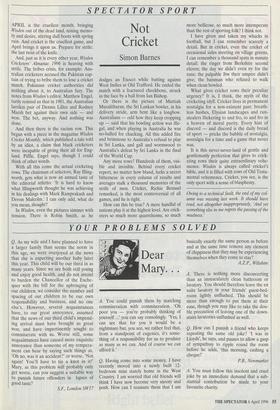SPECTATOR SPORT
Not Cricket
Simon Barnes
APRIL is the cruellest month, bringing Wisden out of the dead land, mixing memo- ry and desire, stirring dull boots with spring rain. And cricket is the cruellest game, and April brings it upon us. Prepare for strife: the last twist of the knife.
And, just as it is every other year, Wisden Cricketers' Almanac 1996 is heaving with strife. The bribes crisis, for example: Aus- tralian cricketers accused the Pakistan cap- tain of trying to bribe them to lose a cricket match. Pakistani cricket authorities did nothing about it, to Australian fury. The notes from Wisden's editor, Matthew Engel, tartly remind us that in 1981, the Australian larrikin pair of Dennis Lillee and Rodney Marsh bet against their own side — and won. The bet, anyway. And nothing was done.
And then there is the racism row. This began with a piece in the magazine Wisden Cricket Monthly, which published a tale told by an idiot, a claim that black cricketers were incapable of giving their all for Eng- land. Piffle, Engel says, though I could think of other words.
With all this come the actual cricketing rows. The chairman of selectors, Ray Illing- worth, gets what is now an annual taste of the editorial stiletto: 'It is hard to know what Illingworth thought he was achieving in his dealings with Mark Ramprakash and Devon Malcolm.' I can only add, what do you mean, thought?
In Wisden, even the pictures simmer with tension. There is Robin Smith, as he dodges an Exocet while batting against West Indies at Old Trafford. He ended the match with a fractured cheekbone, struck in the face by a ball from Ian Bishop.
Or there is the picture of Muttiah Muralitharan, the Sri Lankan bowler, in his delivery stride, arm bent like a longbow. Australians — odd how they keep cropping up — said that his bowling action was ille- gal, and when playing in Australia he was no-balled for chucking. All this added fire and brimstone to Australia's refusal to play in Sri Lanka, and gall and wormwood to Australia's defeat by Sri Lanka in the final of the World Cup.
Any more rows? Hundreds of them, visi- ble and invisible. Behind every cricket report, no matter how bland, lurks a secret bitterness: in every column of results and averages stalk a thousand memories of the strife of men. Cricket, Richie Benaud remarked, is the most controversial of all games, and he is right.
How can this be true? A mere handful of nations play it at the highest level. Are crick- eters so much more quarrelsome, so much more bellicose, so much more intemperate than the rest of sporting folk? I think not.
I have given and taken my whacks in football, but I can remember scarcely a detail. But in cricket, even the cricket of occasional sides meeting on village greens, I can remember a thousand spats in minute detail: the ringer from Berkshire second eleven; the day we didn't even to, for the runs; the palpable lbw their umpire didn't give; the batsman who refused to walk when clean bowled.
What gives cricket rows their peculiar urgency? It is, I think, the myth of the cricketing idyll. Cricket lives in permanent nostalgia for a non-existent past: breath- less hushes, Elysian landscapes and run- stealers flickering to and fro, to and fro in a heaven of moral purity. Every hint of discord — and discord is the daily bread of sport — pricks the bubble of nostalgia, nostalgia for a time and a game that never was.
It is this never-never-land of gentle and gentlemanly perfection that gives to crick- eting rows their quite extraordinary vehe- mence. Wisden is always called cricket's bible, and it is filled with rows of Old Testa- mental vehemence. Cricket, you see, is the only sport with a sense of blasphemy.
Owing to a technical fault, the end of my col- umn was missing last week. It should have read, not altogether inappropriately, And yet something else in me regrets the passing of the madness.'


























































 Previous page
Previous page